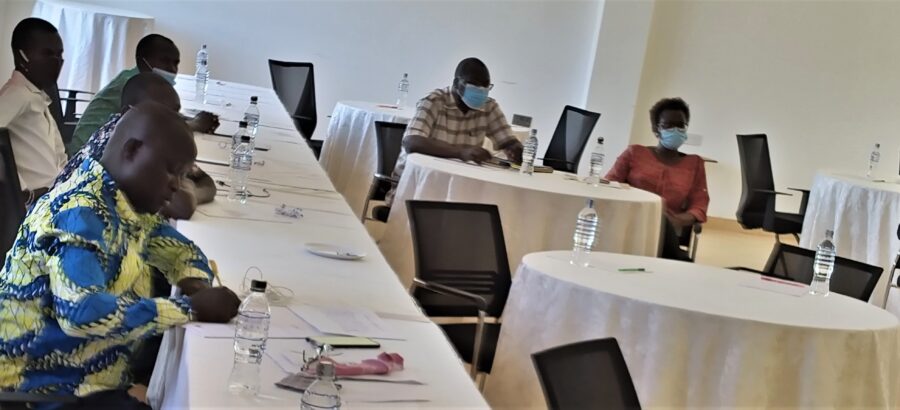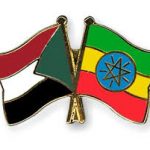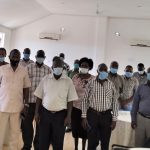Introduction
The EUTF-IGAD Support for Effective Cooperation and Coordination of Cross-border Initiative (SECCCI) Project is a 3-year initiative funded by the European Union (EU) and jointly implemented by UNDP, UNEP in collaboration and partnership with IGAD specialized institutions and other different partners in three clusters of South Omo-Turkana, Marsabit-Moyale and Mandera.
The Intergovernmental Authority on Development (IGAD) is one of eight AU’s Regional Economic Communities (RECs) whose membership comprises eight Member States in the Horn of Africa. Its regional development programmes are informed by its thematic priority areas of focus, including agriculture, livestock and fisheries development, natural resources management, environment protection, social development, regional economic cooperation and integration, peace and security as well as gender affairs.
IGAD’s interventions place special emphasis on human security, livelihoods resilience and development of the cross- border areas that are considered frontiers of regional cooperation and integration as well as areas where human security and development conditions are particularly dire.
Most of IGAD’s overarching programmes such as the IGAD Drought Disaster Resilience and Sustainability Initiatives (IDDRSI) and those implemented by the specialized institutions such as the IGAD Conflict Early Warning and Response Mechanism (IGAD-CEWARN), the IGAD Centre for Pastoral Areas and Livestock Development (ICPALD), the IGAD Climate Prediction and Application Centre (ICPAC) and IGAD Security Sector Programme (ISSP), have tailored objectives towards improving livelihoods of the pastoral and agro-pastoral communities that occupy territories classified as arid and semi-arid lands (ASALs), through selected priority thematic intervention areas.
In contributing towards addressing and supporting priority interventions in the cross-border areas, IGAD, in collaboration with its specialized institutions and UNDP, has been jointly working on SECCCI Project in three clusters namely; South Omo-Turkana (cluster I), Marsabit-Moyale (Cluster II) and Mandera Cluster (cluster III), two of which border Ethiopia and Kenya while the third (Mandera) borders Kenya, Ethiopia and Somalia.
However, implementation of other EU-funded EUTF projects is being carried out by different partners such as VSF Germany Consortium whose membership includes Mercy Corps, TUPADO in Kenya and EPARDA, CIFA and VITA in Ethiopia while BORESHA led by the Danish Refugee Council (DRC) implements EUTF activities in Mandera and PACT in all the clusters but all in partnership with IGAD specialized institutions.
Objectives of the Workshop
- To share available information and raise awareness on the existing MoUs, agreements and protocols on livelihood resilience, peace building and conflict prevention, natural resource use and management, livestock production and trade and movements in the cross-border areas of Ethiopia and Kenya;
- To raise awareness of, review and update existing MoUs, agreements and protocols on livelihood resilience, peace building and conflict prevention, natural resource management, livestock production and movement, and cross-border trade in the cross-border areas of Ethiopia and Kenya;
- To identify gaps in the implementation, enforcement and compliance with MoUs, agreements and protocols and formulate recommendations to address identified gaps in support of the cross-border communities of Ethiopia and Kenya;
- To recommend implementation, enforcement and compliance with MoUs, agreement and protocols that address key drivers of conflict, insecurity and displacement over scarce natural resources and cross-border trade in livestock and other commodities.
The participants discussed MoUs/agreements presented and identified gaps in these MoUs/agreements, on 14th August 2020, as follows:
- With exception of the Kenya-Uganda MoU in Support of the Kenya (Turkana and West Pokot) – Uganda (Karamoja) Cross-border Programme for Sustainable Peace and Development; that established the Joint Technical Steering Committee under the Ministry of Kenya responsible for Arid and Semi-Arid Lands and the Ministry of Uganda responsible for Karamoja Affairs to work closely with relevant National Government Ministries, County/Local Governments, Regional Agencies, UN, IGAD and other Development Partners, other MoUs had established implementation frameworks that do not explicitly ensure inclusion of the Regional/County Governments;
- The Ethiopia – Kenya Special Status on Areas of Agreed Priorities established High Level Joint Tripartite Council (HLJTC) and the Joint Private Investment Council (JPIC); while the Ethiopia – Kenya MOU in Support of the Cross-border Integrated Programme for Sustainable Peace and Socio-economic Transformation instructed UN Country Teams, IGAD and other Development Partners to jointly establish Joint Technical Committees to oversee the implementation of the MOU but most of these established councils and committees seem to have included the Regional/County Governments. In fact, County/Regional Government cannot tell whether these bodies exist or not;
- Scarcity of natural resource has always been the source of intermittent conflict, instability and food and nutrition insecurity;
- Cross-border coordination between the neighbouring cross-border communities remains a weaker link and needs to be strengthened using the existing MoUs and agreements;
- With the Covid-19 pandemic and socio-economic recovery after it, there is need to diversify livelihoods;
- IGAD needs to expedite signing and rectification of the IGAD Transhumance and Movement of People Protocol to improve cross-border trade and market accessibility;
- The SECCCI phased over activities in the Exit Strategy should form basis for formulation of new focused cross-border flagship projects;
- Cross-border local governments to strive to strengthen cross-border coordination, missions to create conducive environment for dialogue and peace-building, including allowing trade-able commodities to freely move between Kenya and Ethiopia;
- Poor or inadequate information flow and involvement of local authorities in dissemination of existing MoUs and agreements as majority of cross-border communities are not aware and do not recognize bilateral agreements and MoUs;
- Coordinated vaccination campaigns and harmonized vaccination calendar across the borderlands need to be implemented under the implementation framework of the signed MoUs;
- Cattle raiding/theft remains to cause insecurity between Turkana and Nyangathom and between Turkana and Dassanech of Ethiopia, which might not be due to conflict over natural resources but a mere retaliation for past raids or killing between these communities;
- Informal trade, which is popular with cross border population, is not supported by local and national authorities – getting trading licenses at cross border points is a major challenge. This and ad hoc rules put in place by offices on the ground creates both tariff and non-tariff barriers to trade, which makes doing business difficult for traders;
- There is need to address counterfeit drugs, chemicals and vaccines, particularly when increased cases of drug resistance and flooding of veterinary drug and vaccine market with counterfeits, expired re-labelled drugs and poor quality drugs and vaccines have been reported.






